Development and Social Change: Exploring the relationship between the Munda Samaj and Service Castes in Jharkhand
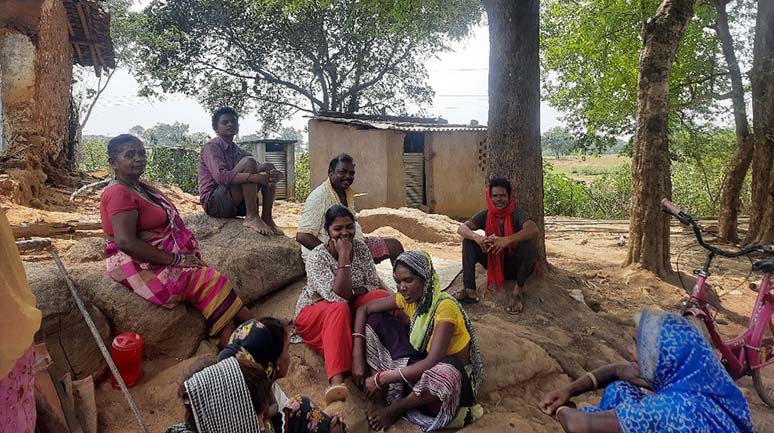
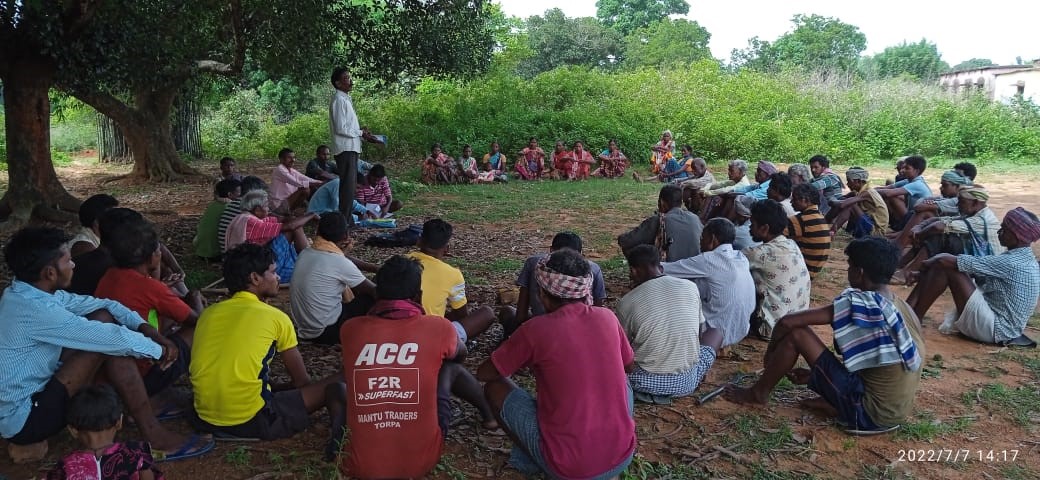
The Adivasi society, primarily governed by kinship bonds is considered non - hierarchical when compared to the highly differentiated caste system. Mandelbaum’s Society in India considered tribal society homogeneous and egalitarian (as cited in Xaxa, 2008). While engaging with the most vulnerable families, I explored the nature of homogeneity within and without the Adivasi community through interviews conducted in 10 villages covering 15 households of Torpa block, Ranchi sub-division, Jharkhand. I conclude that notions of purity and pollution exist between the Munda community and the 'regional' service castes, not necessarily being Adivasi. I look at the historical and socio-political roots of differences in living standards, practices of commensality and the effects of administrative changes on STs and SCs in the region.
A brief history of Service Castes
Jonika Horo (36), of the Munda community in the village of Marcha informs that when the Munda settled in this area many hundred years ago, they brought along families of Lohra (blacksmiths), Turi (basket weavers), Ghasi (grass cutters & musicians), Swasi (cloth weavers) and barbers to provide them with their services. Mundas associated themselves with settled agriculture, hence remained aloof from the activities of service castes. They were given some space in the village to build huts on the periphery of their villages. Lalita Devi (55), a Ghasi says relationship with Munda community was marked with general cordiality.
Settlement and Survival
The service castes no longer occupy the historically assigned peripheries. While some Lohra and Naayi families still live in close vicinity to the Munda households, many Ghasis and Turis have resettled in new hamlets or on town connecting roads. Place names like Nawa, Baniya and Sadak toli, hint at their recent origin. Most service castes are SCs except Lohra, of ST category in Jharkhand.
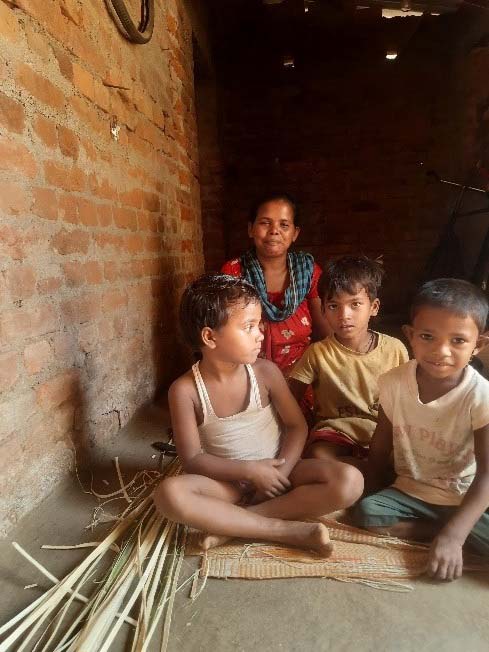
Shobha Devi and Sanichar Manjhi
In the past, the service castes offered their services to the Munda community. The initially limited consumer base has expanded. The Jajmani system has been replaced by money. Shobha Devi (60) says, "Earlier for basket weaving my mother used to receive 3-5 pailas (8-10 kgs) of paddy or pulses but now we are mostly paid in cash." Savitri Devi (35), a Swasi shared "My community of three houses in the village no longer sells products by visiting Munda neighbourhoods." Rekha Devi (30) a Turi, said "We sell bamboo products like soop (seed sorting tool), kumni (fish catcher tool) and naachu (seed broadcasting container) in the market during the season. Basket weaving also has buyers when good quality bamboo is available i.e., during Monsoon and Chhat Puja (October-November). Shiv Charan, a Ghasi (51) informed, "We offer our musical services only on invitation to anyone whether a Sarna, Hindu or Christian.
The occupation is acquiring popularity among the masses, as it promises a good source of income.” Practitioners, therefore, are also no longer limited to the Ghasi community.
As weekly local haats (markets) become vibrant spaces for socio-economic activity, the individual bonds between the service castes and the Munda community have weakened. The 'customized' nature of services has declined. Cooperation between communities has been affected by urbanization and modernization. Social groups also have increased awareness of the viability of identity politics, hence creating new patterns of segregation.
The Munda community is no longer dependent on their services due to technological shifts and does not seem to hold fast to their traditional cultural practices. As a consequence, many service castes have discontinued their traditional services, and others look for supplementary sources of income. A Turi family still weaves baskets but the husband also owns a small cycle repairing shop. Amrit Devi (44) a Lohra informs "Of my three sons, two have migrated-one to Delhi as a construction worker and another to Goa."
Standard of Living
The quality of life in Munda community and the service castes' families is determined by an interplay of factors like power, networks and resources. On one hand, are people like Shiv Charan (51) who has a reach till block office through his networks. He narrated a story about how some officers were not sanctioning his application for Indira Awas Yojana and he managed to get it sanctioned with the help of block officials and clerks. Renu Devi (28) a Lohra informed "The land on which my ancestors were allowed to build their house was owned by a Munda family. The owners of the land left the hamlet years ago and have settled in Assam." This family still doesn't own any land which makes her family vulnerable. A family of five, two adults and three children, they work as labourers on agricultural fields and construction sites apart from beating and moulding iron. While these different sources of income bring in a meagre salary, government schemes offer a glimpse of hope to this family. Similarly, education, wealth and reservations form the basis of the new acquired identity and status which distinguishes Christian Munda from the rest of their religious community. A section of the Sarna Munda is increasingly inclined towards Brahmanic tradition and practices to avail benefits and stake a claim in the status – quo.
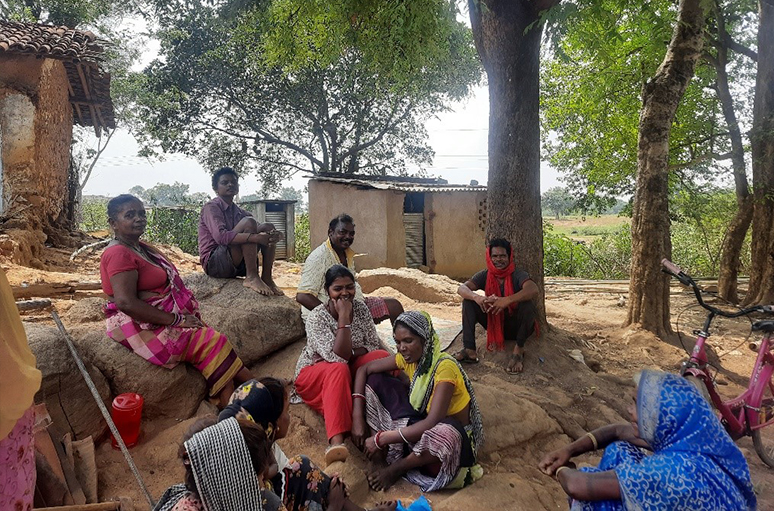
Shiv Charan with his extended family
Most Munda families have availed benefits under National Food Security Act, Pradhan Mantri Awas Yojana or subsequent housing schemes, and other social welfare schemes. They are also the major landowners hence benefitting from agricultural and allied sector schemes. 90% of service caste families interviewed have availed benefits of housing and ration at subsidized rates. In some cases, forced migration was observed. Service caste members often have no other land except that on which their house is built or land given by the host community. They, therefore, move to big cities like Delhi, Shimla and Panaji to work as either construction worker, domestic worker or to do some menial jobs with the support of networks.
Commensality
The service castes practising Brahmanism are part of the caste system. Though they come under the lowest rung of caste hierarchy, the service castes refuse food prepared by Munda. Even those categorized as STs like Lohra, and practice Brahmanism, consider themselves to be better off than Munda. Principles of purity and pollution are also maintained. This is due to the ingrained belief that mixing with others will dilute their caste identity. Exogamy in Sarna and the Hindu community is prohibited whereas marriages with Christian Munda are welcomed but on the condition of conversion.
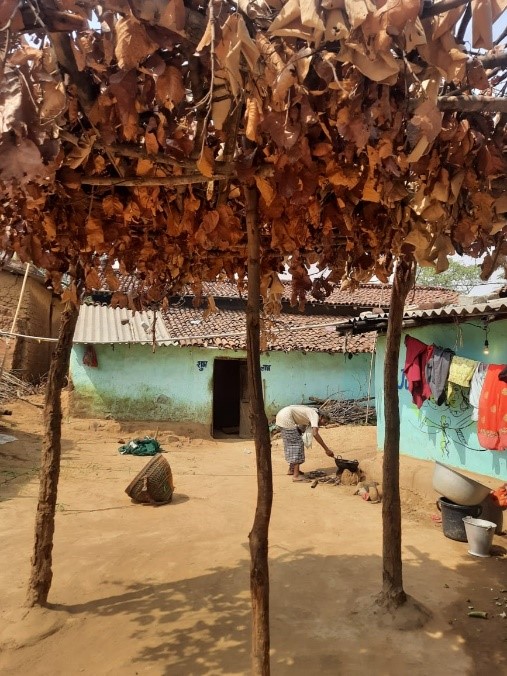
A drum drying under the sun while Phulan Devi talks about commensal practices
Bhagwaan Hajam Thakur (48), a barber shared "We attend Munda functions but do not eat. We prefer raw ingredients which we cook at our homes. The custom is called 'seedha'." If Turi invites Sarna Munda on any occasion, they get food prepared by a Munda so that Munda can eat food. Phulan Devi (53), from a Lohra family stated "Christian Munda are cordial and do not separate us in commensal practices. Whereas, Munda that follow purnadharam offers us food in the corner of the room. We are not allowed to enter their kitchens."
Santoshi Devi (46), a Munda married to a Brahmin, says "The youth irrespective of their caste and religion tend to eat and drink together when unmarried. Restrictions are imposed after marriage and breach of these restrictions is considered to cause harm to their produce by bad spirits."
The commensal practice of service castes and Munda community can be looked through the intersectional lens of caste, class and religion. Service castes- Ghasi, Swasi, Naayi and Turi which fall under the category of SCs, further discriminate against STs such as Lohra and Munda. Savara Munda (57) informed that commensality is also determined by the class of a household. If a Munda family is well reputed, service caste families defy seedha. Exogamy is strictly prohibited by both.
Conclusion
The Central List of Scheduled Castes and Tribes is notified under Articles 341 and 342 of the Indian Constitution. Despite the categorical distinction between different social groups, attempts were made by non-STs to change their caste to ST. For instance, one of the respondents, Meena Devi (name changed) sheepishly shared "My husband fudged his caste certificate for a job as a clerk." Caste groups especially SCs & OBCs have also resorted to such measures to avail reservations and scheme-related benefits. Are they being left out of development efforts in an ST-dominated region? Or are they socially, economically and politically well off in comparison to the dominant ST community?
In some instances, service castes felt they were treated differently, especially during functions organized by Sarnas. Has Sanskritization enabled Sarna Munda to embrace the hierarchical caste system? Many Christian Munda converts also stand by norms of untouchability. Service castes, in spite of being a minority in terms of land ownership and population, also observe the notion of purity and pollution. The intersection of caste, class and religion plays a significant role in shaping the forms of discrimination.
Caste identity is a critical factor in the development paradigm. Recently, we have seen a surge in representational politics. NDA has nominated Droupadi Murmu, of the scheduled tribe, as their candidate for Presidential elections in 2022. Murmu's candidature has symbolic relevance as she would be the first Adivasi woman to make it to the Presidential post. Is this a mere gesture or would it have greater socio – political reverberations for the Adivasi? Representational politics marks inclusivity but may not be enough to ensure development of the Adivasi community as a whole.
References:
- Xaxa, V. (2008). State, Society and Tribes: Issues on Post-Colonial India. Pearson Education India.
- Standing, H. (2017). ‘Munda Religion and Social Structure’, ProQuest.
- Ambedkar, B. R. (1917). ‘Caste in India: Their Mechanism, Genesis and Development” (Vol 41). New York: Indian Antiquary.

